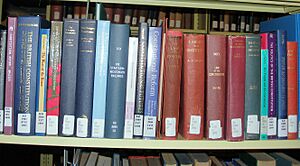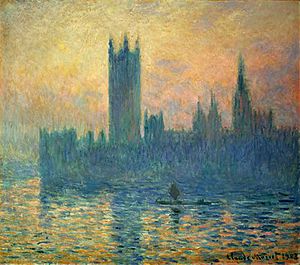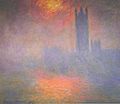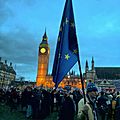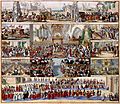Constitution of the United Kingdom facts for kids
The constitution of the United Kingdom is a collection of rules and ideas that explain how the United Kingdom is governed.
Unlike many countries, the UK doesn't have one single document called "the Constitution." Because of this, people often say the UK has an "unwritten" constitution. However, most of these rules are actually written down in laws passed by Parliament, decisions made by courts, and international agreements. Some parts are unwritten, like long-standing customs (called "conventions") and special powers of the King or Queen (called "royal prerogatives").
A key idea in the British constitution is that Parliament is supreme. This means that laws passed by Parliament are the highest laws in the UK. Parliament can change the constitution just by passing new laws.
Contents
How the UK's Constitution Works
The UK's constitution is made up of several important parts.
Laws Passed by Parliament
Laws passed by Parliament are called Acts of Parliament. These laws are approved by the King or Queen, the House of Lords, and the House of Commons. Sometimes, the House of Commons can pass laws without the House of Lords' full approval, using special rules. The King or Queen almost never refuses to approve a law today.
Acts of Parliament are very important for the constitution. Traditionally, Parliament can make any law it wants on any topic. For example, much of the famous old document called Magna Carta has been changed or removed by Parliament over time. Courts usually cannot question laws passed by Parliament. However, some judges are starting to think differently about this.
International Agreements (Treaties)
Treaties are agreements between countries. When the UK signs a treaty, it doesn't automatically become part of UK law. However, important treaties are often turned into UK law through Acts of Parliament. For instance, the European Convention on Human Rights was largely made part of UK law by the Human Rights Act 1998.
European Union Law (Past Influence)
From 1973 until 2020, the UK was part of the European Union (EU). During this time, EU laws had a big impact on the UK constitution. EU law often took priority over UK laws. This meant that if a UK law conflicted with an EU law, the EU law would usually be followed. This showed how much EU membership changed the UK's legal system. The UK left the EU in 2020.
Court Decisions (Common Law)
The UK uses a legal system called common law. This means that decisions made by higher courts become rules (called precedents or case law) that lower courts must follow. These court decisions also help shape the constitution.
Some important court cases in history have limited the power of the government, like the Case of Proclamations and Entick v. Carrington.
Customs and Traditions (Conventions)
Many British constitutional conventions are old traditions. For example, the King or Queen must act on the advice of their ministers. These conventions are not formal laws that can be enforced in court. Instead, they are followed because not doing so would cause political problems.
Royal Prerogative (King's Powers)
The royal prerogative refers to special powers that belong to the King or Queen, but are not written in laws. In practice, ministers (government officials) usually use these powers on behalf of the King or Queen.
These powers include:
- Making decisions about war and peace.
- Calling, suspending, or ending Parliament sessions.
- Managing the Civil Service.
- Signing international treaties.
- Issuing passports.
The most important power still personally used by the King or Queen is choosing the Prime Minister. However, this is usually done by asking the leader of the party with the most seats in the House of Commons. The King or Queen's powers are not unlimited; Parliament can remove them.
Flexible Nature of the UK Constitution
Unlike countries like the United States that created their constitutions all at once, the UK's constitution has grown and changed over many centuries. It's like an old tree that has slowly developed. This makes it very flexible, meaning it can adapt to new situations.
However, because it's so flexible and not written in one document, some people worry that big changes could be made without much public support.
Until recently, there wasn't a modern law that clearly listed the rights of citizens, like freedom of speech. This was partly because people were thought to have the right to do anything not specifically forbidden by law. The Human Rights Act 1998 changed this by making the European Convention on Human Rights directly enforceable in British courts.
Main Ideas of the UK Constitution
Parliamentary Supremacy and the Rule of Law
Two main ideas of the British constitution are Parliamentary supremacy and the rule of law.
- Parliamentary supremacy means that Parliament is the highest law-making body. Its laws are the most important in the UK.
- The rule of law means that everyone, including the government, is equal before the law and must follow it.
The idea of Parliament's power has been debated. For example, could Parliament repeal laws that gave independence to former colonies? Some argue it could, legally, even if it couldn't enforce it. Others say such an idea is absurd.
When the UK joined the European Economic Community (now the EU) in 1973, it agreed to the idea that EU law was supreme. This meant that if a UK law clashed with an EU law, UK courts had to follow the EU law. This showed a challenge to Parliament's traditional supremacy. However, the UK left the EU in 2020, so this is no longer the case.
Unitary State
The UK is a unitary state. This means that power is held by the central government in London. Unlike countries like the United States which are federations (where power is shared between central and regional governments), in the UK, regional bodies like the Scottish Parliament get their powers from the UK Parliament. The UK Parliament could, in theory, abolish them.
Constitutional Monarchy
Constitutional monarchy is another key idea. It means "the King or Queen reigns, but they do not rule." This means the monarch is the head of state, but their powers are mostly symbolic and they act on the advice of elected ministers. This idea goes back a long way in British history.
Government and Parliament
The UK's government is closely linked to Parliament. The government (called "Her Majesty's Government") is formed by members of Parliament. This means that the people who make the laws are also the ones who carry them out.
Because the government usually has a majority in Parliament, there isn't much formal control over the government's law-making power. This is why some people have called the system an "elective dictatorship," meaning the elected government has a lot of power. However, important principles like the rule of law are very old and deeply rooted, making them hard to get rid of.
Important Laws and Customs
One result of Parliament's supremacy is that all Acts of Parliament are generally seen as equally important. However, some judges have suggested that certain "constitutional statutes," like Magna Carta and the Human Rights Act 1998, might have a higher status. This idea is still being discussed by legal experts.
Some Key Laws
- Magna Carta (1215) - An ancient document limiting the King's power.
- Bill of Rights 1689 - Set out rights of Parliament and limits on the monarch.
- Act of Settlement 1701 - Decided who could inherit the throne.
- Act of Union 1707 - Joined England and Scotland to form Great Britain.
- Reform Act 1832 - Began to expand who could vote.
- Parliament Acts (1911 and 1949) - Limited the power of the House of Lords.
- European Communities Act 1972 - Made EU law apply in the UK (now repealed).
- Human Rights Act 1998 - Made the European Convention on Human Rights part of UK law.
- Scotland Act 1998, Government of Wales Act 1998, Northern Ireland Act 1998 - Created devolved parliaments/assemblies.
- House of Lords Act 1999 - Removed most hereditary peers from the House of Lords.
- Freedom of Information Act 2000 - Gives people the right to ask for information from public bodies.
- Constitutional Reform Act 2005 - Changed the role of the Lord Chancellor and created the UK Supreme Court.
Some Important Customs (Conventions)
- The King or Queen will always approve laws passed by Parliament.
- The monarch will not dissolve Parliament without the Prime Minister's advice.
- The monarch will ask the leader of the winning party in the House of Commons to form a government.
- Ministers must be members of the House of Commons or the House of Lords.
- The House of Lords will usually accept laws that were part of the government's election promises (the 'Salisbury Convention').
- Individual Ministerial Responsibility: Ministers are responsible for their department's actions.
- Collective Ministerial Responsibility: All government ministers must publicly support government decisions.
Recent Changes to the Constitution
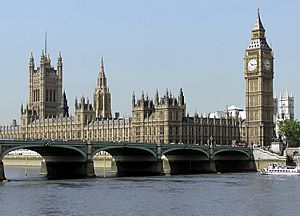
In recent years, there have been big changes to the UK constitution.
The Human Rights Act 1998 gave citizens specific rights and allowed courts to help enforce them. Courts can suggest that Parliament change laws that conflict with human rights, though Parliament doesn't have to.
Power has also been shared more widely across the UK. New parliaments were set up in Scotland and assemblies in Wales and Northern Ireland. This means the UK is now sometimes called "quasi-federal," because England doesn't have its own separate parliament and is still directly ruled from Westminster.
These changes have slightly weakened the idea of Parliament's absolute supremacy, even though Parliament could still, in theory, get rid of the devolved assemblies or the Human Rights Act. However, this is unlikely to happen.
The Freedom of Information Act 2000 also changed how open the government is, allowing people to ask for more details about its work.
The Constitutional Reform Act 2005 changed the House of Lords by separating its law-making and judicial (court) roles. For example, the Lord Chancellor's powers were split, and a new Supreme Court of the United Kingdom was created, moving the highest judges out of the House of Lords.
Other pages
Images for kids
-
Parliament is central to the United Kingdom's democratic constitution. In the Palace of Westminster the House of Commons represents the public in 650 UK constituencies and chooses the prime minister at will. The House of Lords remains unelected but can be overruled.
-
(London, Houses of Parliament. The Sun Shining through the Fog by Claude Monet, 1904) Parliament (from old French, parler, "to talk") is the UK's highest law-making body. Though not codified, the UK's constitution is written in hundreds of Acts of Parliament, court cases, and in documented conventions. Its essential principles are Parliamentary sovereignty, the rule of law, democracy and internationalism.
-
The UK has committed to international law as a "sovereign" member, to augment its power through cooperation, in the United Nations since 1945. The first UN General Assembly was held at Methodist Central Hall, opened by Prime Minister Clement Attlee.
-
From 1973 to 2020, the UK was a member state of the European Union (and its predecessor organisation the European Communities), which is committed to "human dignity, freedom, democracy, equality, the rule of law and respect for human rights".
-
The European Court of Human Rights, following common law principles, protects the rule of law by requiring people's liberty, privacy or other rights are not infringed by the government unless there is a clear legal basis and justification.
-
The most broadly accepted meaning of the rule of law, advocated by Lord Bingham of Cornhill, includes the principle of legality, human rights and commitment to democracy and international law.
-
Parliament was recognised as a forum for the King for "common counsel" before the Magna Carta 1215.
-
The UK system of parliamentary democracy ensures that the executive, and the prime minister, is removable by a simple majority vote in the House of Commons. The executive is bound to the rule of law, interpreted by the judiciary, but the judiciary may not declare an Act of Parliament to be unconstitutional.
-
The House of Commons is the most important body in the British constitution. Its Members of Parliament are democratically elected by constituencies across the UK, and the parties who have a majority in the Commons form the British government.
-
The House of Lords is a chamber mostly appointed by the prime minister, loosely based on the Lords' expertise, achievement, or political affiliation. Since the abolition of most hereditary peers, there has been ongoing debate about whether or how to elect the House of Lords.
-
Proceedings in the UK Supreme Court, which moved to its modern home at Middlesex Guildhall in 2009, are web-streamed live, and judges no longer wear wigs.
-
The prime minister, at 10 Downing Street, exercises political power of the British government, when they command majority support of the House of Commons.
-
U.S. President Barack Obama (L) meeting with Opposition leader Jeremy Corbyn (R): The task of the official opposition, currently led by Sir Keir Starmer of the Labour Party, is to hold the government and the Prime Minister to account in and out of Parliament.
-
Whitehall hosts the major offices of the British government, led by cabinet ministers. Facing towards Big Ben is a statue of Charles I, who was executed in 1649 following the English Civil War.
-
At Speakers' Corner of Hyde Park, London, here the people traditionally gather to exchange views, debate, and listen. Debating and free speech societies are found throughout the UK and make a regular part of TV.
-
Any person in the UK who is significantly affected by a public body's act can challenge a decision by judicial review. The claims usually begin in the High Court.
-
John Ball, a leader of the Peasants' Revolt of 1381 following repression after the Black Death, preached that "matters goeth not well to pass in England, nor shall not do till everything be common, and that there be no villains nor gentlemen, but that we may be all unied [sic] together, and that the lords be no greater masters than we be."
-
The Glorious Revolution of 1688 confirmed Parliament's supremacy over the monarch, represented by John Locke's Second Treatise on Government (1689). This laid the foundations for a peaceful unification of England and Scotland in the Act of Union 1707.
-
To demand democratic reform, the Chartists met on Kennington Common during the Revolutions of 1848.
-
The evolution of the British Empire. After the end of the Second World War, the Empire was gradually dismantled via a process of decolonisation, with the majority of former British colonies choosing to join the Commonwealth of Nations. The Commonwealth is open to any country committed to peace, liberty, equality, and development, as stipulated in the Harare Declaration of 1991.
See also
 In Spanish: Constitución del Reino Unido para niños
In Spanish: Constitución del Reino Unido para niños


